-

新人教版高中英语必修3Unit 4 Space Exploration-Reading For Writing教学设计一
另一方面,其余的人反对这个计划,因为它可能会导致一些不好的影响。7.I hold the belief that space exploration not only enable us to understand how the universe began but also help us survived well into the future.我坚信探索太空不仅能够使我们了解宇宙的起源而且能够帮助我们更好地走进未来。8.I think we should spend more time and money exploring space so as to provide new and better solutions to people's shortterm and longterm problems.为了给人类的短期和长期问题提供更新和更好的解决方法,我认为我们应该花更多的时间和金钱来探索太空。9.From my point of view,it is wrong of young people to depend on their telephones too much,which may do harm to both their physical and mental health.在我看来,年轻人过度依赖手机是不对的,因为它们可能会对他们的身心健康都有害。最近你班同学就“人类是否应该进行宇宙探索”这个问题进行了激烈的讨论。有人认为,探索宇宙不仅让人类更好地了解宇宙的发展,还可以用来指导农业生产,以及把一些探索太空的高新技术用于现实生活;也有一些人认为探索太空花掉了大量的人力物力;影响了人们的生活水平。请你根据以下情况写一篇报告并发表自己的观点。注意:1.写作内容应包括以上全部要点,可适当发挥,使上下文连贯;

新人教版高中英语必修3Unit 5 The Value of Money- Discovering Useful Structure教学设计
Step 3 Meaning1. 过去将来时表示从过去某一时间来看将要发生的动作或存在的状态, 常用在宾语从句中。一般由“would/should +动词原形”构成。She hoped that they would meet again someday. 她希望将来有一天他们能再见面。2. was/were going to+动词原形: 表示过去将要发生或很有可能发生的动作, 常用于口语中, 表示预言、意图或者打算等。He was going to start work the following week. 他打算下星期开始工作。3. was/were about to do: 常用来表示即将发生的动作, “刚要/正要做……”。注意该结构不与任何时间状语连用。I felt that something terrible was about to happen. 我感到某种可怕的事情即将发生。4.was/were to do: 表示“曾计划做某事”, 如果表示“本来计划做某事, 动作没实现”, 则需用 “was/were to have done”。She said she was to have told me about the accident. 她说她本来想告诉我关于事故的事。5.Start, go, come, leave, see, meet等动词的过去进行时: 表示就过去某一时刻而言即将发生的动作。She was coming later. 她随后就来。I had just put on my overcoat and was leaving to visit a friend of mine. 我刚穿上外套要去看我的一个朋友。

新人教版高中英语必修3Unit 5 The Value of Money-Listening &Speaking&Talking教学设计
4. A:We’d like to have someone to say a word at the beginning to welcome the group.B:↙Who?A:We thought that you or Dr.Johnson might do it.B用降调说Who,其意思是问,对方想让谁在开场时致欢迎词。Step 6 Pronunciation---Practice1. Listen to the short conversation and mark the intonation with ↗, ↙ or ↙, ↗. Then discuss with a partner what they intend to convey by using different intonation.Owner: You know what ?↗ It’s a million-pound bank note↙.Waiter 1: Really ?↗(question)Waiter 2: Really !↙(unbelievable and surprised)Waiter 3: Really ?!↙↗(first question then surprised)2. Listen to the conversations. Underline the parts that are stressed and mark the intonation. Then talk about the implied meanings of the responses with different intonations. Listen again and repeat.1) Henry: It’s a nice suit.Owner: Oh, it’s perfect!↙(The intonation means it is very suitable for Henry.)2) Henry: Well, that’s very kind of you.Owner: Kind, sir ?↗(what you said is not right) No, it’s kind of you. You must come whenever you want and have whatever you like. Just having you sit here is a great honour !!↙(welcome you to come again)3)Henry:Well, to be honest, I have none. Oliver:(happily) What luck!(excited) Brother↗, what luck!↙(It means “Didn’t you hear it?”)Henry: Well, it may seem lucky to you but not to me!↗(angry) If this is your idea of some kind of joke, I don’t think it’s very funny. Now if you’ll excuse me, I ought to be on my way.↙(If so, I would leave.)Roderick: Please don’t go↙...(hope Henry can wait for a moment)Part B Viewing and Talking---Describe people’s changing attitudes in a film clipStep 1 Before-listening---Tell the filmYou are going to watch part of the film The Million Pound Bank Note. Look at these photos and guess what happens in the film.

新人教版高中英语必修3Unit 5 The Value of Money-Listening &Speaking教学设计
Step 4: Listen again and decide if the following statements are true (T) or false (F).1 It was the first time Chen Liyan's story was reported. T口 F口2 Chen found 10,000 yuan in a small plastic bag in Taiyuan railway station口 F口3 Wang Zheng apologized to Chen because he couldn't offer her more money. T口 F口4 Chen took out a large loan to cure her daughter, T口 F口5 Wang set up a fundraising website for Chen's daughter after Chen told him about her situation. T口 F口Step 5:After listening, discuss the questions.1 What kind of person do you think Chen Liyan is?Chen Liyan is generous and honest because she returned a large sum of money to the owner.2 Did Chen return the money because she didn't need it?No. She returned the money because it was the right thing to do. Evidence for this is that she refused to accept the reward money because she felt that it had not been earned. 3 Is it common for people to do what Chen did?It depends on the culture. In some countries it is quite common to return money that has been found. In other countries, people believe "Finders are keepers!" 4 How did Wang Zheng feel about the return of his money?He must have been very happy and relieved to have gotten his money back. We know this because he thanked Chen repeatedly and even offered her a reward.5 Why did Ma Dongbao tell Wang about Chen's family?He must have had great sympathy for Chen and her daughter and wanted to help them.'We know this because he arranged help for them. 6 How did the news reporter feel about Chen's actions?The news reporter felt that it showed that money wasn't the most important thing in life. We know this because the reporter told us that this is what Chen believes. and then said, “that's a great attitude to take."

新人教版高中英语必修3Unit 5 The value of money-Reading and Thinking教学设计二
? Could you offer me some kind of work here?? I don’t want your charity, I just want an honest job.? Careless: I landed in Britain by accident.Step 7:Consolidation.? Find Henry? Roderick and Oliver were I .making a bet when they saw Henry, a poor young man. ? Know Henry? About a month ago, Henry was sailing and later he found himself carried out to sea by a strong wind. Fortunately, he 2.was spotted by a ship. And it was the ship that brought him to 3.England? Offer money to Henry ? Oliver and Roderick gave Henry a letter and told him that there was money in it. They 4.persuaded him to accept it, and made him 5.promise that it wouldn't be opened until 2 o'clock.Step 8:Language pointsa large amount of: a large quantity of; a great deal ofe.g. They bought a large amount of furniture before they moved their new house.make a bet: make an arrangement to risk money, etc. on an event of which the result is doubtful.e.g. We made a bet on the result of the match.permit sb to do something: allow somebody to do somethinge.g. My mother doesn’t permit me to ride in the street after it rained.by accident: as a result of chancee.g. I only found it by accident.stare at: look at somebody or something with the eyes wide open in a fixed gaze( in astonishment, wonder, fear, etc)to be honest: to tell you the truth; to be franke.g. To be honest, I don’t think we have a chance of winning.Step7 Homework:What do you think will happen to Henry? Will the bank-note help him or get him into trouble?

新人教版高中英语必修3Unit 5 The Value of Money-Reading and Thinking教学设计一
Everybody wants to get wealth.In today’s material world,making money or becoming wealthy symbolizes a person’s success and capability. Many people just make every effort, pay any price to attain greater wealth. With money,they can buy nice, large apartments in nice neighborhood. With money they can own luxurious cars. Wealth seems to bring all happiness in life.But is wealth the only road to happiness? Not really. There are many things in the world, which are beyond the means of money, such as friendship, love, health and knowledge. People are so preoccupied with struggling for money that they have no time or would not take the time to form or maintain friendship. What happiness can they feel living as lonely miserable creatures without love or friends in the world even if they accumulate tremendous wealth?In my opinion, people can’t do anything without money, but money is not everything. What money will bring you depends on your personal belief and goal in life. If you are kind enough to help others, especially the poor, money is a good thing to you. With it, you can do much more for the benefit of people and your country, and it will add to your own happiness. If you want money just for your own needs, you’ll never be satisfied or happy. In a word,you should have money spent for more people. Only then can money be the source of your happiness.Step 8 Homework4 students in a group, one acts Roderick, one Oliver, one servant and the fourth one acts Henry Adams, then listen to the tape, pay more attention to the difference between American English and British English in pronunciation, stress, tone.

新人教版高中英语必修3Unit 5 The Value of Money-Reading for Writing教学设计二
2. 您能看到, 我头发太长了。You can see that my hair is much too long.3. 无论什么时候, 只要您想回来就回来。Please come back whenever you want.4. 您仅有很少的头发要理! You only have too little hair to cut !5. 为您服务是我的荣幸!It is my honour to serve you!Step 9 Writing(Henry is walking down the street when he sees a sign for a place that cuts hair. He decides to have it cut. )H=Henry B=BarberH: Good afternoon, I’d like to have my hair cut, if I may. (The barber looks at Henry’s hair and continues cutting another man’s hair. ) Er, I’d really like a haircut. As you can see it’s much too long. B: (in a rude manner) Yes, I can see that. Indeed, I can. H: Fine, well, I’ll have a seat then. (He sits in one of the barber’s chairs. The barber turns to look at Henry. )B: It’s quite expensive here, you know! Are you sure you can afford it?H: Yes. I think so. (After his hair is cut, the barber tells Henry how much he must pay. Henry shows the barber the bank note. )B: Why Mr. . . (looks shocked)H: Adams. Henry Adams. I’m sorry. I don’t have any change. B: Please don’t worry! (wearing a big smile) Nothing to worry about! Nothing at all! Please come back whenever you want, even if you only have too little hair to cut! It will be my honour to serve you!Step 10 Pair workExchange drafts with a partner. Use this checklist to help your partner revise his/her draft.1. Are all the elements of a play included and in good order ?2. Do the character use suitable language ?3. Are the stage directions clear and useful ?4. Is the plot clear and exciting enough ?

新人教版高中英语必修3Unit 5 the value of money-Reading For Writing教学设计一
【参考范文】Narrator:(Henry is smiling as he leaves the restaurant. As he is walking down the street, he sees a sign for a place that cuts hair. He decides to get it cut. )H=Henry;B=Barber;R=rude manH:Good afternoon, I'd like to get a cut, if I may. (The barber looks at Henry's hair and continues cutting another man's hair. )Er, I'd really like a haircut. As you can see it's much too long. B:(in a rude manner) Yes, I can see that. Indeed, I can. H:Fine, well I'll have a seat then. (He sits in one of the barber's chairs. The barber turns to look at Henry. )B:It's quite expensive here, you know!Are you sure you can afford it?H:Yes. I think so. (In comes the rude man. )R:Hey you there. I need a haircut quickly. Can you do me straightaway?B:All right, then, get in the chair and I'll see what I can do. R:Thank you. (sits down in one of the barber's chairs)H:Excuse me, but I was here first. Aren't you going to do my hair first?B:This man's in a hurry. H:Well so am I!I insist that you cut my hair first. B:OK, but I'll have to be quick. This gentleman is waiting. H:Thank you. (They both become quiet. After his hair is cut, the barber tells Henry how much he must pay. Henry shows the barber the bank note. )B:Why, Mr . . . (looks shocked)H:Adams. Henry Adams. I'm sorry, I don't have any change. R:You're that Mr Adams! Well,I'm glad I waited or I might never have known it was you. B:Why, Mr Adams, please don't worry!(wearing a big smile) Nothing to worry about!Nothing at all!Please come back any time, even if you only need too little hairs cut!It will be my honour to serve you!
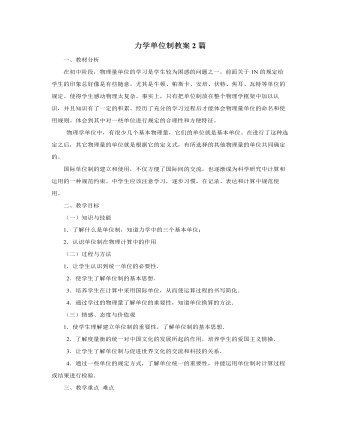
人教版新课标高中物理必修1力学单位制教案2篇
一、教材分析在初中阶段,物理量单位的学习是学生较为困惑的问题之一。前面关于1N的规定给学生的印象总好像是有些随意。尤其是牛顿、帕斯卡、安培、伏特、焦耳、瓦特等单位的规定。使得学生感动物理太复杂。事实上,只有把单位制放在整个物理学框架中加以认识,并且知识有了一定的积累。经历了充分的学习过程后才能体会物理量单位的命名和使用规则。体会到其中对一些单位进行规定的合理性和方便特征。物理学单位中,有很少几个基本物理量,它们的单位就是基本单位。在进行了这种选定之后,其它物理量的单位就是根据它的定义式,有所选择的其他物理量的单位共同确定的。国际单位制的建立和使用,不仅方便了国际间的交流,也逐渐成为科学研究中计算和运用的一种规范约束。中学生应该注意学习,逐步习惯,在记录、表达和计算中规范使用。二、教学目标(一)知识与技能1.了解什么是单位制,知道力学中的三个基本单位;2.认识单位制在物理计算中的作用
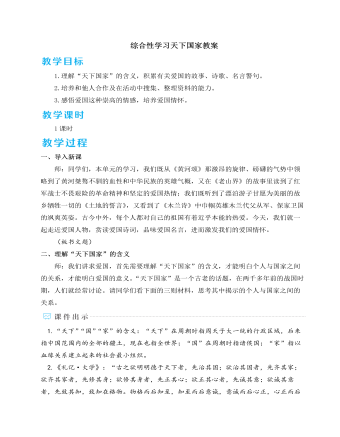
人教部编版七年级下册综合性学习天下国家教案
我荣幸地以中华民族一员的资格,而成为世界公民。我是中国人民的儿子。我深情地爱着我的祖国和人民。 ——邓小平一个人只要热爱自己的祖国,有一颗爱国之心,就什么事情都能解决。什么苦楚,什么冤屈都受得了。 ——冰心做人最大的事情是什么呢?就是要知道怎么样爱国。 ——孙中山能够献身于自己祖国的事业,为实现理想而斗争,这是最光荣不过的事情了。——吴玉章外国爱国名言示例:我们为祖国服务,也不能都采用同一方式,每个人应该按照资禀,各尽所能。——歌德纵使世界给我珍宝和荣誉,我也不愿离开我的祖国。因为纵使我的祖国在耻辱之中,我还是喜欢、热爱、祝福我的祖国。 ——裴多菲我重视祖国的利益,甚于自己的生命和我所珍爱的儿女。 ——莎士比亚我无论做什么,始终在想着,只要我的精力允许我的话,我就要首先为我的祖国服务。 ——巴甫洛夫
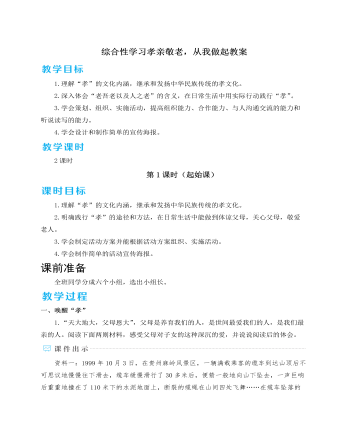
人教部编版七年级下册综合性学习孝亲敬老,从我做起教案
本环节旨在通过展示、评价践行“孝亲敬老”的活动成果,深化 “孝”的境界,培养学生回报家人、关爱他人的美德。展示过程中,学生的语言表达能力、诵读能力、搜集和整理资料的能力、写作能力得到了提升,同时也增强了自信心。二、谈“孝”心1.在这为期一周的践行“孝”的活动中,你有哪些体会和感受?请与大家分享。(生小组内交流,小组代表发言)预设 示例一:在这次践行“孝”的活动中,我做了许多表达孝心的事情,从中体会到了父母工作的艰辛、赚钱的不易,更能体谅他们了。我也了解到平时我不经意说的话伤害了父母,让父母担忧难过了。现在我与父母之间的关系变得更加融洽,父母对我的一些事情也能够理解了,我发现只要我们对父母多一些尊重和理解,他们就会非常开心。示例二:我在采访爷爷奶奶时,了解到祖辈们的人生经历和具体事迹,被他们身上的一些精神品质所感动,更加钦佩他们了。这次的采访活动增强了我与家人之间的沟通,增进了我与家人之间的情感交流,也让我进一步了解了我们家族的一些历史,让我有了为家族努力奋斗的使命感。
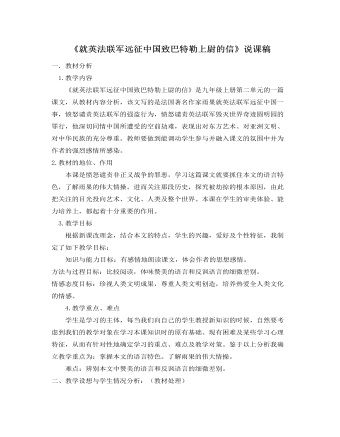
部编版语文九年级上册《就英法联军远征中国致巴特勒上尉的信》说课稿
1.教学内容《就英法联军远征中国致巴特勒上尉的信》是九年级上册第二单元的一篇课文,从教材内容分析,该文写的是法国著名作家雨果就英法联军远征中国一事,愤怒谴责英法联军的强盗行为,愤怒谴责英法联军毁灭世界奇迹圆明园的罪行,他深切同情中国所遭受的空前劫难,表现出对东方艺术、对亚洲文明、对中华民族的充分尊重。教师要做到能调动学生参与并融入课文的氛围中并为作者的强烈感情所感染。2.教材的地位、作用本课是愤怒谴责非正义战争的罪恶,学习这篇课文就要抓住本文的语言特色,了解雨果的伟大情操。进而关注那段历史,探究被劫掠的根本原因,由此把关注的目光投向艺术、文化、人类及整个世界。本课在学生的审美体验、能力培养上,都起着十分重要的作用。3.教学目标根据新课改理念,结合本文的特点,学生的兴趣,爱好及个性特征,我制定了如下教学目标:
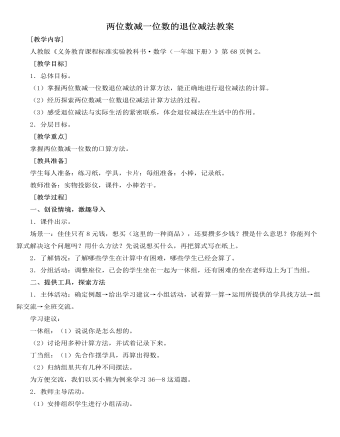
人教版新课标小学数学一年级下册两位数减一位数的退位减法教案
2.送信。实物投影仪演示反馈。(1)方法说明。你是怎么想的?(2)错误纠正。分层校对:做完的先互相批改,然后集体先校对丁当组题,再校对一休组题。重点讲评一休组题目。六、总结今天你有哪些收获?(1)退位减法要注意什么?不要忘记退位。(2)退位减法的方法。为学生提供学习材料,让学生通过活动联系生活实际学习新知,让学生感受到数学源于生活,用于生活;采用分层教学,整个学习过程都是学生在小组中合作研究、探索中完成的;然后通过多种形式的练习加以巩固;注重学习过程的开放;通过小组合作,培养学生善于发表自己的观点,会倾听同学的意见的能力。同时也培养学生学会提出问题、解决问题的能力。
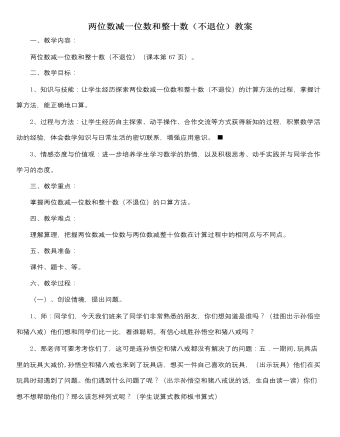
人教版新课标小学数学一年级下册两位数减一位数和整十数(不退位)教案
一、教学内容:两位数减一位数和整十数(不退位)(课本第67页)。二、教学目标:1、知识与技能:让学生经历探索两位数减一位数和整十数(不退位)的计算方法的过程,掌握计算方法,能正确地口算。2、过程与方法:让学生经历自主探索、动手操作、合作交流等方式获得新知的过程,积累数学活动的经验,体会数学知识与日常生活的密切联系,增强应用意识。3、情感态度与价值观:进一步培养学生学习数学的热情,以及积极思考、动手实践并与同学合作学习的态度。三、教学重点:掌握两位数减一位数和整十数(不退位)的口算方法。四、教学难点:理解算理,把握两位数减一位数与两位数减整十位数在计算过程中的相同点与不同点。五、教具准备:课件、题卡、等。六、教学过程:(一)、创设情境,提出问题。
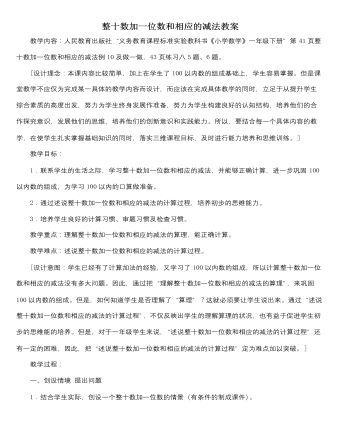
人教版新课标小学数学一年级下册整十数加一位数和相应的减法教案
[设计意图:巩固减法的意义,培养学生初步的思维能力。](2)组织学生自己先算一算,教师巡视,捕捉学生学习信息,纠正不良学习习惯。[设计意图:通过巡视,及时捕捉学生的学习信息,发现问题及时解决;把培养学生良好的计算习惯、审题习惯及检查习惯落到实处。](3)组织学生全班交流计算方法。组织学生在全班交流解决计算“32-2=”的方法,引导学生理解“32是由3个十和2个一组成,从32里去掉2,就剩3个十,所以32减2等于30”。如果学生用其他的方法来计算,只要正确,也要肯定。[设计意图:同前面一样,巩固数的组成,训练每一个学生“述说整十数加一位数相应减法的计算过程”,突破难点。]3.加减法对比组织学生比较“30+2=32”和“32-2=30”,并说一说有什么发现,使学生认识到“3个十和2个一组成32,所以30加2等于32;反过来,32是由3个十和2个一组成,从32里去掉2,就剩3个十,所以32减2等于30”[设计意图:强化加减法意义的联系,培养学生初步的思维能力。]
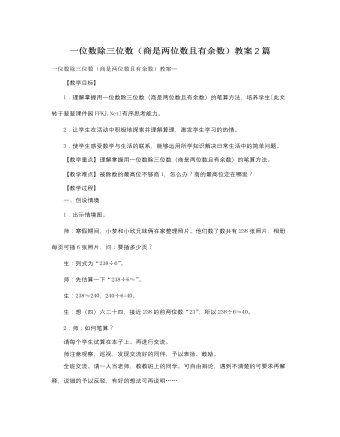
人教版新课标小学数学三年级下册一位数除三位数(商是两位数且有余数)教案2篇
二、互动交流,理解算法1.出示教科书第22页的情境图,提问:他们在干什么?你获得了什么信息?能提出什么问题?怎样列式?2.师:今天我们就学习一位数除三位数的计算方法。(板书课题:一位数除三位数)3.师:怎样计算238÷6呢?你能用估算的方法估计出大致结果吗?4.学生尝试独立完成例3的竖式计算。师:在这道题中被除数最高位上是2个百,2个百除以6,商不够1个百怎么办?师:谁能说一说商3个十的3写在商的什么位置上?为什么?教师边板演边说明:用除数6去乘3个十,积是18个十,表示被除数中已经分掉的数,写在23的下面。23减18得5,表示十位上还剩5个十。师:接下来该怎么办?(把被除数个位上的8落下来,与十位上的5合起来继续除。)师:最后结果是多少?5.启发学生想一想:如果一本相册有24页,一本相册能插得下这些照片吗?2本呢?
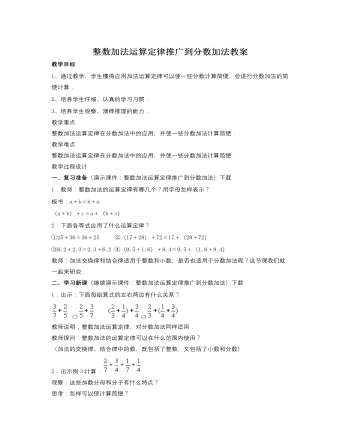
人教版新课标小学数学五年级下册整数加法运算定律推广到分数加法教案
教学目标1、通过教学,学生懂得应用加法运算定律可以使一些分数计算简便,会进行分数加法的简便计算.2、培养学生仔细、认真的学习习惯.3、培养学生观察、演绎推理的能力.教学重点整数加法运算定律在分数加法中的应用,并使一些分数加法计算简便.教学难点整数加法运算定律在分数加法中的应用,并使一些分数加法计算简便.教学过程设计一、复习准备(演示课件:整数加法运算定律推广到分数加法)下载1.教师:整数加法的运算定律有哪几个?用字母怎样表示?板书:a+b=b+a(a+b)+c=a+(b+c)2.下面各等式应用了什么运算定律?①25+36=36+25 ②(17+28)+72=17+(28+72)③6.2+2.3=2.3+6.2 ④(0.5+1.6)+8.4=0.5+(1.6+8.4)教师:加法交换律和结合律适用于整数和小数,是否也适用于分数加法呢?这节课我们就一起来研究.二、学习新课(继续演示课件:整数加法运算定律推广到分数加法)下载1.出示:下面每组算式的左右两边有什么关系?
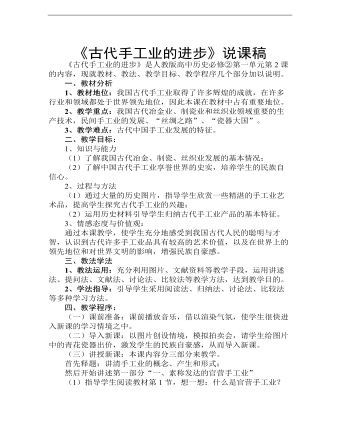
高中历史人教版必修二《第2课古代手工业的进步》说课稿
二、教学目标:1、知识与能力(1)了解我国古代冶金、制瓷、丝织业发展的基本情况;(2)了解中国古代手工业享誉世界的史实,培养学生的民族自信心。2、过程与方法(1)通过大量的历史图片,指导学生欣赏一些精湛的手工业艺术品,提高学生探究古代手工业的兴趣;(2)运用历史材料引导学生归纳古代手工业产品的基本特征。3、情感态度与价值观:通过本课教学,使学生充分地感受到我国古代人民的聪明与才智,认识到古代许多手工业品具有较高的艺术价值,以及在世界上的领先地位和对世界文明的影响,增强民族自豪感。
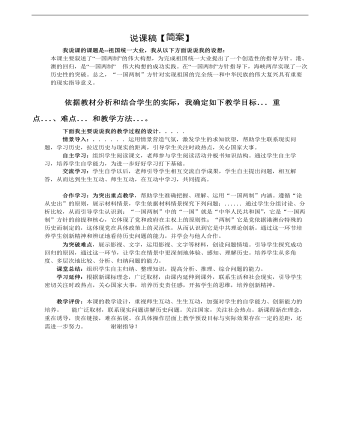
高中历史人教版必修一《第22课祖国统一大业(简案)》说课稿
情景导入:......运用情景营造气氛,激发学生的求知欲望,帮助学生联系现实问题,学习历史,拉近历史与现实的距离,引导学生关注时政热点,关心国家大事。自主学习:组织学生阅读课文,老师参与学生阅读活动并板书知识结构。通过学生自主学习,培养学生自学能力,为进一步好好学习打下基础。交流学习:学生自学以后,老师引导学生相互交流自学成果,学生自主提出问题,相互解答,从而达到生生互动、师生互动,在互动中学习,共同提高
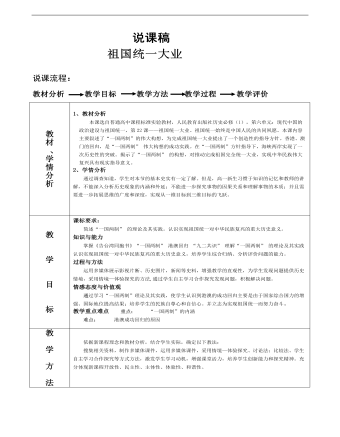
高中历史人教版必修一《第22课祖国统一大业》说课稿
1、教材分析 本课选自普通高中课程标准实验教材,人民教育出版社历史必修(1),第六单元:现代中国的政治建设与祖国统一,第22课——祖国统一大业。祖国统一始终是中国人民的共同夙愿。本课内容主要叙述了“一国两制”的伟大构想,为完成祖国统一大业提出了一个创造性的指导方针。香港、澳门的回归,是“一国两制” 伟大构想的成功实践。在“一国两制”方针指导下,海峡两岸实现了一次历史性的突破。揭示了“一国两制” 的构想,对推动完成祖国完全统一大业,实现中华民族伟大复兴具有现实指导意义。 2、学情分析通过调查知道,学生对本节的基本史实有一定了解。但是,高一新生习惯于知识的记忆和教师的讲解,不能深入分析历史现象的内涵和外延;不能进一步探究事物的因果关系和理解事物的本质;并且需要进一步拓展思维的广度和深度,实现从一维目标到三维目标的飞跃。



